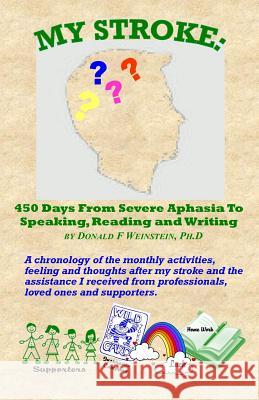My Stroke: 450 Days From Severe Aphasia Speaking, Reading, and Writing » książka
My Stroke: 450 Days From Severe Aphasia Speaking, Reading, and Writing
ISBN-13: 9780615231235 / Angielski / Miękka / 2014 / 178 str.
Readers of My Stroke by Dr. Weinstein will follow, step by step, his recovery from an Embolic Cerebrovascular Accident with Severe Aphasia. After his Stroke, he couldn't speak, read, write, sing or do arithmetic. This book takes a look at what goes into the spirit and soul of one stroke aphasia victim and survivor, the nuances that are not spoken about in cursory workshops and never detailed in lectures; a difficult journey with emotional highs and lows, anger and fear, issues of dignity and humiliation. He discusses shifting roles within the family, neuropsychological reports with throbbing pain and accomplishments. He details struggles to relearn reading, writing, speaking, singing, mathematics, interview skill strategies. He lets you feel the accomplishments of achieving a sound, a letter, a word, a simple sentence, and compensatory strategies, which are huge for a person with severe aphasia. Fifteen months later he was able to read a classic novel, very slowly, a solitary action, word by word, reading aloud slowly very slowly. He wrote a professional report, tediously, at a snail's pace, finding computer keys one letter at a time, trying to write a sentence, a paragraph and finally a page. He shares the emotions of singing at a Passover Seder, the melodies in his genes, but not easily retrieved from his brain. Hebrew words that were lost in his head do to his aphasia, but the brain has the incredible capability to modify itself, to form new connections between brain neurons and find what was lost. He found some of his fluency with Spanish on a vacation trip to Puerto Rico. Yet he was not "whole' but he continues to grow each day. Dr. Weinstein's forceful journey back from severe aphasia was moving. His accounts wrestle with discussions that every graduate school aphasia class needs to read and thrash out, knowing that the effects of aphasia vary from person to person. Even speech therapists will gain insight into what it is like to live with aphasia on a daily basis. He writes in depth about his experience with speech therapy and the exercises which helped him. Aphasiacs and their caregivers will share the difficult road back as they go from aphasia victim to aphasia survivor. Each chapter provides a check list for stroke survivors, and their spouses, family and friends, to help them deal more effectively with the consequences of stroke and aphasia. Weinstein's grasp of himself and others are very powerful and send a message of hope; he discovered how to live with aphasia. His "come back" from severe aphasia was dependent on himself, his drive, effort, ability and hard work to persevere over frustration and also the love and devotion of his family, the guidance and support of his speech-language pathologist and all the staff at the rehabilitation center, other doctors and nurses and the cheering from the sidelines of special friends; in other words, his community, each with unique qualities that Weinstein needed and required. But neither Weinstein nor the wonderful cast of characters, the protagonists, of Weinstein's story, knew what their roles were precisely other then caring. These caregivers, Weinstein's wife, son and daughter-in-law, and granddaughters, professionals, family and friends are seen in the vignettes that are integrated through this book; if you look closely you might see yourself in your mind's eye. There are streams of consciousness and free flow thoughts wrapped throughout each chapter. These allow you, the stroke victim and the spouse, to see the way that real life intermixes with both of you. The idea is that you may see something that is important to you that you didn't think about before and it may help you. The watchwords for this book are "frank," "inspirational" and "hope"; these are the unspoken words of many aphasiacs some who are not able to talk and express their thoughts. Dr. Weinstein talks for them.











